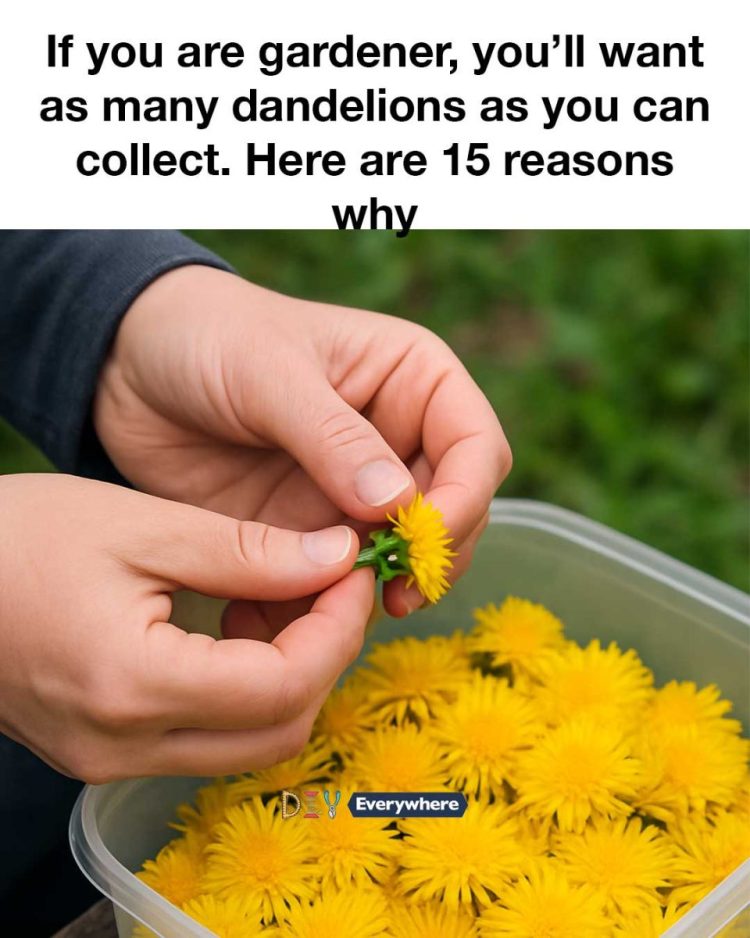Often dismissed as pesky weeds, dandelions (Taraxacum officinale) are actually a gardener’s secret ally. These resilient plants offer a multitude of benefits that can enhance your gardening experience. From improving soil health to attracting beneficial insects, dandelions are more than just a pretty yellow flower. This article explores 15 compelling reasons why gardeners should embrace dandelions in their gardens.
Understanding the Versatility of Dandelions in Gardening
Dandelions are incredibly versatile plants that can serve multiple purposes in a garden. Their deep taproots—sometimes extending up to 15 inches (38 cm) into the soil—break up compacted earth, improving aeration and water infiltration. Additionally, every part of the dandelion is usable, from roots to flowers, making them a valuable resource for sustainable and zero-waste gardening practices.
1. A Natural Soil Aerator
The long, sturdy taproots of dandelions penetrate even the hardest soils, breaking up compaction naturally. This process enhances the flow of air, nutrients, and water deep into the soil layers, reducing the need for mechanical aerators. Plant density of about 5–10 dandelions per square foot can significantly impact soil structure in neglected areas.
2. Superfood in Your Backyard
Dandelions are nutritional powerhouses. A single cup (about 55 grams) of dandelion greens contains:
Over 110% of the recommended daily intake of Vitamin A
30% of Vitamin C
500% of Vitamin K
Plus significant amounts of calcium, iron, and potassium These greens can be sautéed, added to salads, or blended into smoothies.
3. Early Season Pollinator Magnet
Dandelions are among the first flowers to bloom in early spring, often in March or April. Their bright yellow blooms provide vital nectar and pollen to bees, butterflies, and other pollinators when little else is available.
4. Attracting Beneficial Insects for Pest Control
Ladybugs, lacewings, and parasitic wasps are drawn to dandelions, where they lay eggs and hunt prey. These insects naturally control aphids, mites, and other common garden pests, reducing the need for chemical pesticides.
5. Natural Mulch for Moisture Retention
Shredded dandelion leaves layered around plants (2–3 inches thick) create an effective mulch that retains soil moisture and suppresses weeds. As they decompose, they also feed the soil with organic matter.
6. Boosting Compost Piles
Dandelions decompose quickly and are rich in nitrogen, making them excellent “green” material for compost. For a balanced compost pile, use about 1 part dandelions to 2 parts carbon-rich “brown” materials (like dried leaves or straw).
7. Homemade Dandelion Fertilizer Tea
To make dandelion fertilizer tea:
Fill a 5-gallon (19-liter) bucket with roughly half a pound (about 225 grams) of dandelion leaves and flowers.
Top with water and steep for 2–3 days.
Strain and use the resulting tea to water plants at the root zone for a nutrient boost rich in potassium, calcium, and magnesium.
8. Natural Herbicide from Dandelion Roots
You can brew a concentrated dandelion root tea (boil 1 cup of chopped roots in 4 cups of water) and use it as a targeted herbicide spray on weeds. It’s a non-toxic alternative to glyphosate-based products.
see continuation on next page
